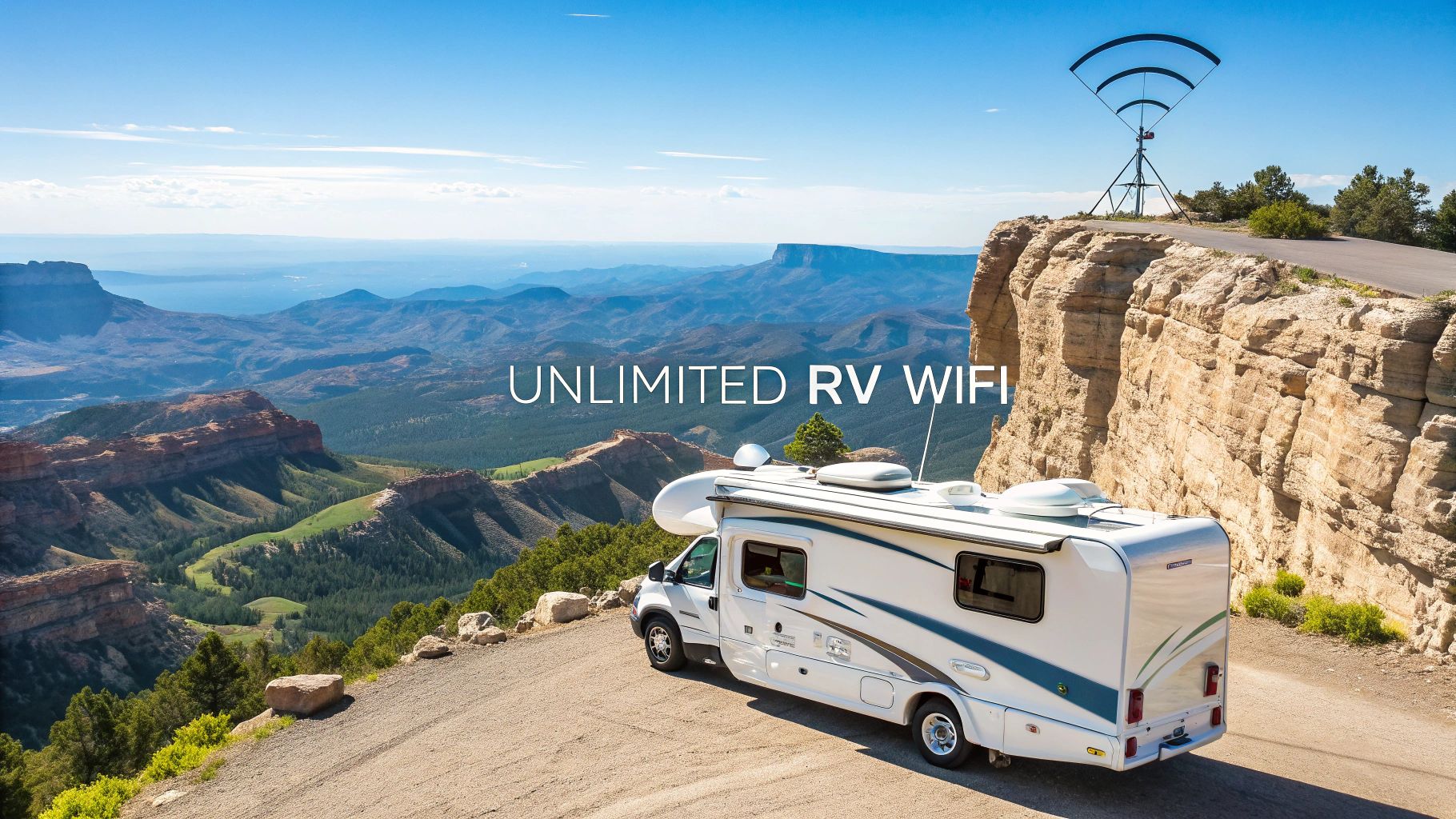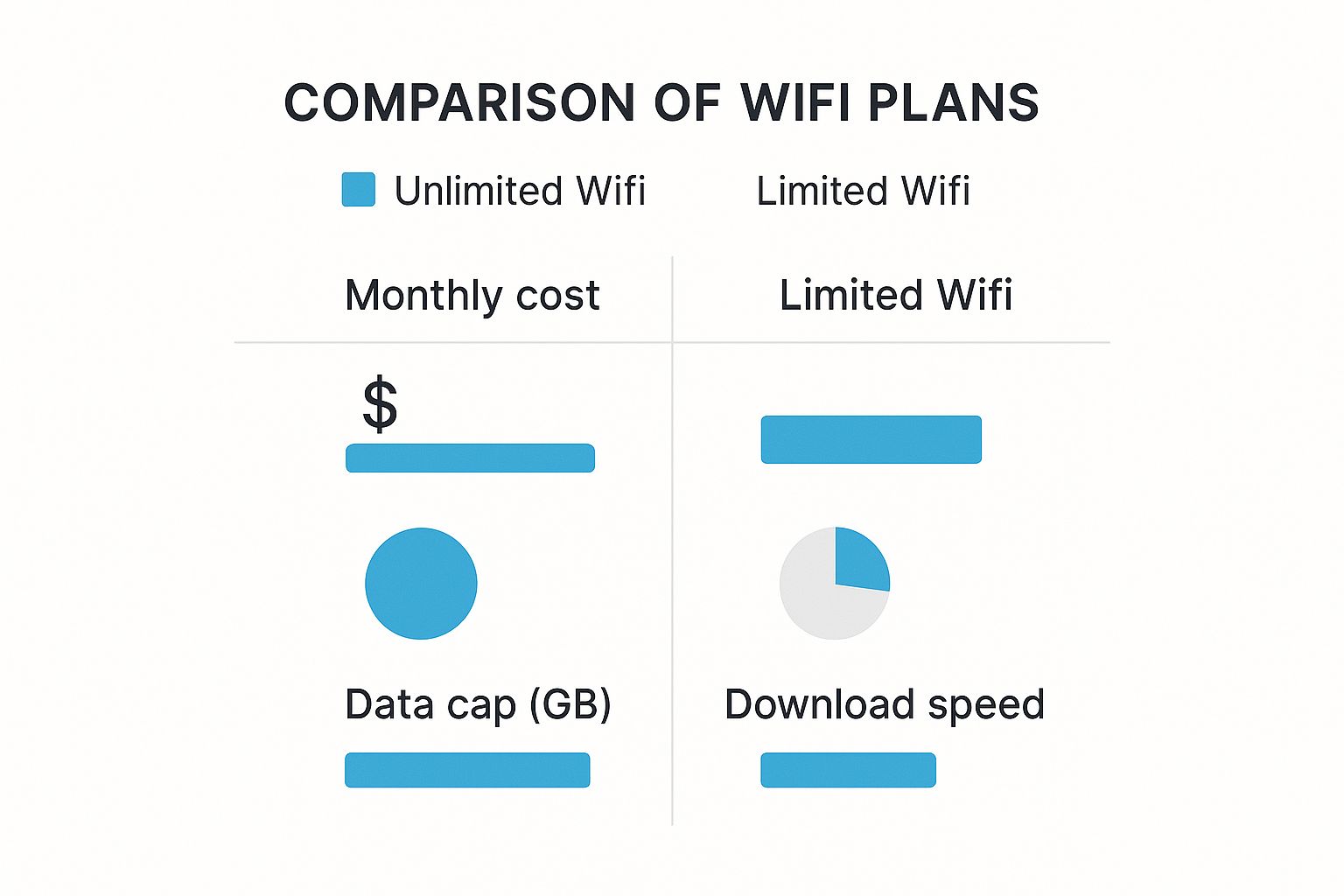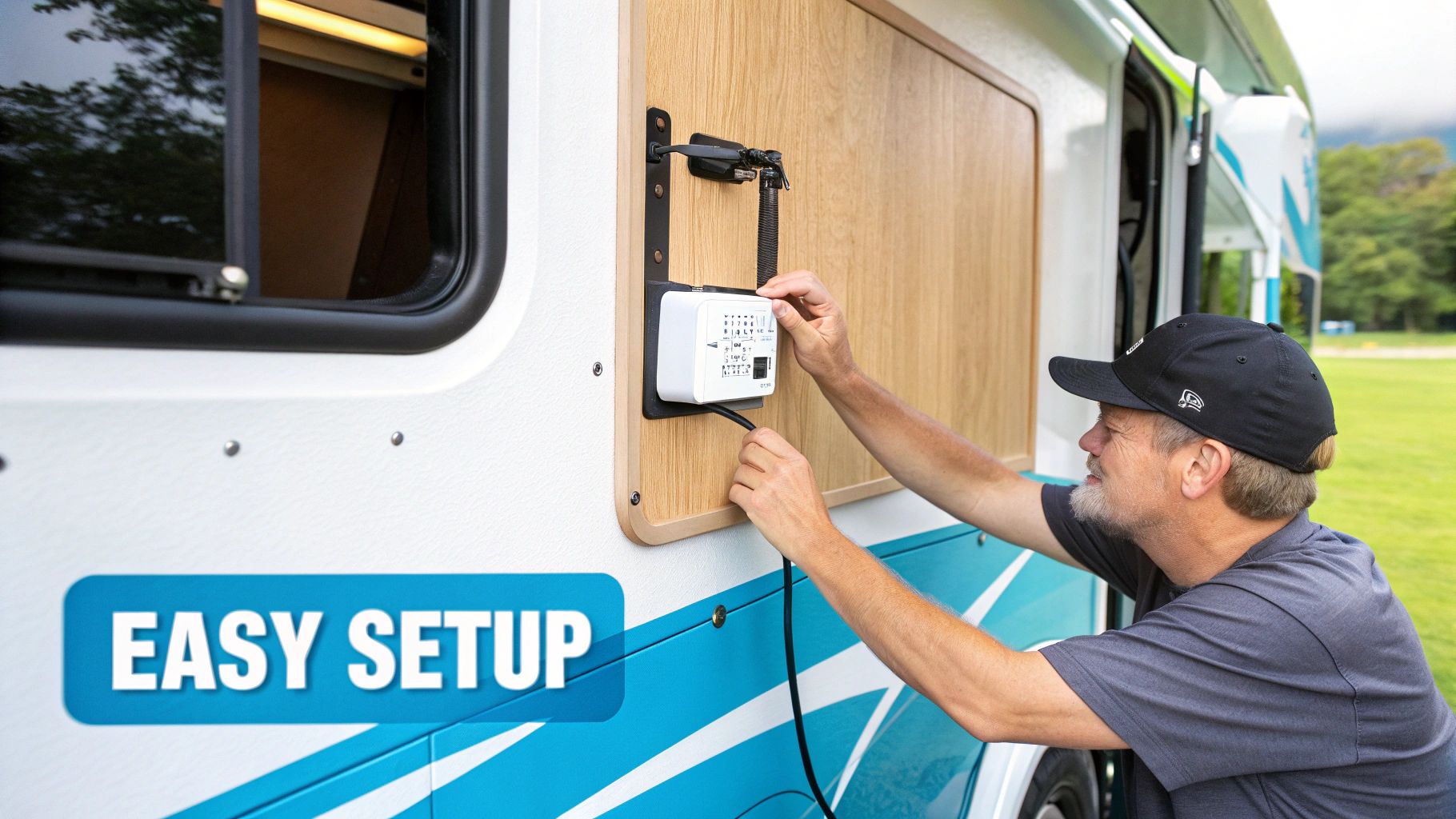

· Por James
Unlimited WiFi for RV Your Ultimate Guide
Finding reliable, truly unlimited WiFi for your RV can feel like a pipedream, but I promise you, it's totally achievable with the right combination of modern tech. The best setups I've seen—and used myself—usually mix and match cellular hotspots from providers like SwiftNet Wifi, satellite internet like Starlink Roam, and sometimes a signal booster to give weak connections a little extra oomph.
This guide is your roadmap to building the perfect system for staying connected, no matter where the road takes you.
Your Roadmap To Reliable RV Internet
Welcome to the only guide you'll need for setting up dependable internet in your RV. It wasn't that long ago that finding a stable connection on the road was a constant, frustrating headache. Today, it’s not just a nice-to-have; it's a non-negotiable for most of us.
Whether it’s for remote work, online school for the kids, streaming a movie on a rainy day, or just navigating to the next scenic overlook, a solid internet connection is part of modern RV life. This guide is designed to cut through the noise and give you clear, straightforward advice so you can make a decision you feel good about.
We're going to break down the three main ways to get reliable, unlimited WiFi for RV travel:
- Cellular Hotspots: These handy devices tap into 4G and 5G networks, giving you a flexible and widely available internet source just about anywhere you can get a cell signal.
- Satellite Internet: This has been a complete game-changer, especially for off-grid travel. It provides high-speed internet almost anywhere you have a clear view of the sky.
- Signal Boosters: Think of these as amplifiers for your connection. They take a weak, barely-there cellular signal and turn it into something you can actually use.
This image really drives home the difference between a typical "unlimited" plan you might see advertised and a plan that has frustrating limits. It lays out the real-world impact on cost, data caps, and performance.

As you can see, a true unlimited plan might cost more upfront, but it completely gets rid of data caps and usually delivers much better speeds. It's an investment in peace of mind.
To help you get a quick sense of which path might be right for you, here’s a high-level comparison of the technologies we'll be diving into.
Quick Comparison of RV WiFi Solutions
| Technology | Best For | Primary Limitation |
|---|---|---|
| Cellular Hotspots | Travelers who stick to areas with decent cell coverage and need flexibility. | Requires a good signal from a cell tower to work effectively. |
| Satellite Internet | Boondockers and off-grid explorers who need a connection in remote locations. | Needs a clear, unobstructed view of the sky; can be pricey. |
| Signal Boosters | RVers who frequently camp on the fringe of cell service and need to amplify weak signals. | Can't create a signal where one doesn't exist at all; only enhances what's there. |
Each of these technologies has its place, and often, the ultimate solution is a blend of two or even all three.
The goal here isn't to find a single "best" answer, but to build a system that works for your specific travel style and budget. Whether you're a weekend warrior, a full-time digital nomad, or an off-grid explorer, a dependable connection is totally within reach. By understanding the pros and cons, you can stop stressing about finding a signal and get back to enjoying the freedom of the open road.
Why Consistent RV Internet is Non-Negotiable
Not that long ago, getting online in an RV was a nice little bonus—something you’d use to quickly check emails or the weather forecast. Today, that story has completely changed. For a growing community of modern travelers, a reliable connection is now a core utility, right up there with electricity and water.
This isn't just about streaming movies after a long day of driving. It's a fundamental shift in how people are choosing to live, work, and explore. The classic dream of the open road has merged with the very real demands of daily life, turning the search for unlimited wifi for rv travel into a top priority for thousands.
A New Generation of Travelers
The old picture of who an RVer is? It’s getting a major update. Today’s travelers are more diverse and digitally connected than ever, and each of them has a critical need for internet that just works. This includes people like:
- Digital Nomads: These are the professionals who’ve happily traded a corner office for a stunning scenic overlook. For them, a stable internet connection isn't just a perk—it's their direct lifeline to a career. It's what powers their video calls, file sharing, and team collaboration from literally anywhere.
- Road-Schooling Families: More and more families are hitting the road, turning travel into a hands-on educational experience. Their RV is a classroom on wheels, and that classroom needs dependable internet for online lessons, research projects, and even virtual field trips.
- Connected Retirees: Modern retirees aren't just unplugging; they're managing their lives online. From telehealth appointments and online banking to staying in touch with grandkids over video chat, a spotty connection can bring these essential activities to a grinding halt.
This explosion in demand for mobile connectivity is happening in lockstep with the growth of the RV lifestyle itself. The RV market has been on a tear, with U.S. wholesale shipments expected to hit around 333,700 units in 2024—a 7% increase from the year before. And it’s not slowing down. Projections for 2025 see another 5% year-over-year growth to 350,000 units, with steady increases on the horizon through 2030. You can dig into more of the data on these RV market trends and see what it means for the whole ecosystem, including RV parks.

The main idea is simple: As more people choose the RV life for work, school, and just managing their day-to-day, the need for powerful, reliable internet has skyrocketed. The "good enough" Wi-Fi from a campground just doesn't cut it anymore.
This is the new reality. It’s exactly why figuring out your options for unlimited wifi for rv travel is so incredibly important. It’s no longer about just getting online; it’s about building a mobile command center that can support your unique adventures without compromise. Whether you're presenting to a client from a national park or helping your kid with their homework, your internet simply can't be an afterthought.
Navigating Your Cellular Internet Options
For most RVers, cellular internet is the backbone of their setup. Think of it as your phone’s hotspot, but on steroids—a system built to power your entire rig. It works by tapping into the same 4G LTE and 5G networks your phone uses, which is why it’s the go-to for travelers. It hits that sweet spot of performance, cost, and convenience, giving you a connection almost anywhere you can get a cell signal.
Cellular is often the first and most critical piece of the connectivity puzzle. It’s flexible and familiar, whether you’re parked at a busy campground or a quiet boondocking spot just outside of town. The real trick is pairing the right hardware with a data plan that actually fits your travel style.
Understanding Cellular Plans and Devices
When you start digging into cellular for your RV, you’ll find a couple of common paths: a dedicated mobile hotspot or a more heavy-duty cellular router.
- Dedicated Hotspots: These are the small, portable gadgets you’ve probably seen, like a Verizon Jetpack. They’re battery-powered, dead simple to use, and great for connecting a few devices at a time. If you’re a weekend warrior or a part-time RVer, a hotspot is a fantastic starting point.
- Cellular Routers: For full-timers and anyone working from the road, a cellular router is a serious upgrade. These are more powerful, often with ports for external antennas, and are designed to be permanently installed. The result is a stronger, more stable signal that can handle a whole household of devices without breaking a sweat.
Picking a data plan is just as crucial as the gear. You can go straight to the major carriers like Verizon, AT&T, and T-Mobile, or you can check out third-party resellers. These smaller companies often bundle data from multiple networks, giving you more flexibility.
Let's talk about the word "unlimited" in the cellular world, because it rarely means what you think. Your service won't just shut off, but many plans come with a catch. Once you hit a certain data threshold—say, 100GB—your provider might slam on the brakes and slow your speeds to a crawl. This is called throttling, and it's always buried in the fine print.
Decoding 4G LTE vs. 5G for RV Life
You'll see both 4G LTE and 5G tossed around, but for an RVer, the practical difference is huge. 5G is incredibly fast, but its coverage is still mostly clustered around cities and populated areas. 4G LTE, on the other hand, is the reliable workhorse of the two, with much broader coverage across the rural stretches of America where we love to roam.
For most of us, having a device that can tap into both 4G LTE and 5G is the winning ticket. This way, you get blistering speeds when you’re near a town and a dependable connection when you’re out in the boonies.
The market for RV-specific internet has exploded. As of 2025, you can find plans from both major carriers and specialized providers built for travelers. For example, some companies are now offering plans with genuinely unlimited data that don’t get throttled. SwiftNet Wifi, for one, has an unlimited plan that pulls from both 5G and 4G LTE networks, making it a pretty compelling option. You can see how they stack up by checking out a comparison of the best RV wifi plans and their features.
Unlocking Total Freedom with Satellite Internet

While cellular internet is a fantastic tool for most RVers, what happens when you decide to venture truly off the beaten path? I’m talking about those incredible spots—deep forests, remote desert valleys, and secluded mountain passes—where cell towers are just a distant memory. This is where satellite internet becomes your new best friend.
For any RVer who refuses to be limited by a cell signal map, modern satellite systems are the ultimate solution. Imagine having a personal communication link that follows you anywhere. It works by connecting a small, portable dish on the ground directly to a constellation of satellites orbiting the Earth, completely bypassing the need for cell towers. If you're chasing true unlimited wifi for rv travel without boundaries, satellite is the key.
The Power of True Off-Grid Connectivity
The biggest win for satellite internet is its incredible reach. As long as your dish has a clear, unobstructed view of the sky, you can get high-speed internet. Seriously. This is a massive breakthrough for boondockers and full-timers who love exploring national parks and other places where cell bars are nonexistent.
There are a few key things you'll need to get your head around with modern satellite systems:
- Hardware Essentials: Your basic setup will include a satellite dish (often called a "Dishy"), a tripod or mount to hold it, a router for your local network, and all the necessary cables. It's designed to be portable and is surprisingly easy to set up once you get to your campsite.
- Power Consumption: Be warned: these dishes are power-hungry. You'll need a robust power system to keep it running, especially if you’re off-grid for a while. Think a solid solar setup with a good battery bank or a generator.
- Stationary vs. In-Motion Use: Most consumer-grade satellite plans are built for stationary use. You park, you set it up, you get online. But for those who want the ultimate convenience, premium options offer flat-mounted, in-motion dishes that provide a connection even while you're driving. These come with a much higher price tag, of course. You can check out our guide on the top satellite internet for RV options in 2025 to compare the different systems out there.
What Makes Satellite a Game-Changer
Beyond just coverage, the data plans are what really seal the deal. Satellite internet, especially with services like Starlink Roam, has completely redefined what unlimited wifi for rv users can expect. Most cellular plans eventually throttle or deprioritize your data after a certain point. Many satellite plans, on the other hand, have no hard data caps, allowing you to use terabytes of data each month without seeing a slowdown. That freedom is essential for remote work, streaming your favorite shows, and keeping in touch from literally anywhere your RV can go.
Satellite internet is the answer for the RVer who prioritizes connection over location. It removes the guesswork and anxiety of finding a signal, allowing you to choose your destination based on scenery and adventure, not cell tower proximity.
Now, this level of freedom does come with a higher upfront hardware cost and a larger physical footprint than a tiny cellular hotspot. But for those of us who demand a reliable, high-speed connection in the most remote corners of the country, the investment is absolutely worth it. It’s the closest you can get to guaranteeing you’ll be connected, no matter where you park.
Choosing the Right RV WiFi for Your Travels
When you start digging into unlimited wifi for rv travel, you quickly realize there's no single "best" option that works for everyone. The perfect setup is deeply personal—it’s a balancing act between your travel style, how much you depend on the internet, and what your budget looks like.
What a full-time digital nomad needs to stay employed is worlds away from what a family heading out for a week-long camping trip requires.
To cut through the noise, let's look at this through the lens of three common RVer profiles. See which one sounds the most like you. This will point you toward a solid recommendation and, more importantly, explain why it's the right fit, so you can invest with confidence.
The Weekend Warrior
You're all about those weekend getaways and occasional week-long vacations. Most of your time is spent in established campgrounds or state parks where you can usually count on at least some cell service. Your internet needs are pretty standard: checking emails, mapping out tomorrow's hike, streaming a movie after a long day, and keeping the kids from staging a mutiny.
- Recommended Setup: A reliable cellular hotspot.
- Why It Works: For this style of travel, cellular is a perfect match. It's affordable, incredibly easy to set up, and delivers solid performance in the more populated areas you tend to visit. The upfront hardware cost is minimal, and you can often find flexible data plans that don't lock you into a pricey contract. You simply don't need the expense or hassle of a satellite system for trips where a cell signal is almost always within reach.
The Full-Time Remote Worker
Your RV isn't just a vehicle; it's your office. A rock-solid, high-speed internet connection isn't a luxury—it's non-negotiable. Your entire workday revolves around video calls, uploading hefty files, and constant collaboration with your team. You roam far and wide, from urban hubs to the fringes of civilization, and "the internet is down" is a phrase you can't afford to say.
- Recommended Setup: A hybrid system that pairs a high-performance cellular router with a satellite internet service like Starlink Roam.
- Why It Works: For you, redundancy is the name of the game. A powerful cellular router, ideally boosted with external antennas, becomes your workhorse connection in most locations. But when you venture off the beaten path where cell towers are just a memory, you can deploy your satellite dish and keep right on working. This two-pronged approach is the ultimate safety net for a mobile career.
This strategy of layering internet sources means you're almost never without a connection. You can even configure your router to automatically failover to the strongest signal, taking all the guesswork out of staying online.
The Off-Grid Explorer
You, my friend, are an adventurer. Your heart belongs to boondocking on vast stretches of national forest, BLM land, and quiet deserts—places where cell service is a distant rumor. Freedom and solitude are your priorities, but you still want a dependable way to check weather reports, connect with family, and unwind with some online entertainment.
- Recommended Setup: A satellite internet system.
- Why It Works: When you're truly out there, coverage is king. Satellite is the only technology that delivers genuine high-speed internet in the remote places you love, where cell signals simply don't exist. The hardware costs more upfront, no doubt. But what you're buying is the freedom to camp virtually anywhere with a clear view of the sky, without ever having to sacrifice your connection to the world.
By matching your travel style to one of these profiles, the path to the right internet solution becomes much clearer.
For a much deeper dive into the specific brands and plans out there, be sure to check out our detailed guide on the 7 best unlimited internet for RV options in 2025. It's the perfect next step for comparing the top players in the market.
Answering Your Top RV WiFi Questions

Even after you've done all the research and picked a setup, you're bound to have questions. That's just part of the journey. Getting your RV internet dialed in perfectly often means making small adjustments and learning as you go.
Think of this as your go-to FAQ for the real-world stuff. We've gathered the most common questions we hear from fellow RVers and laid out the answers, plain and simple, to help you fine-tune your connection and stay online.
Can I Use Multiple Internet Sources at Once?
Absolutely. In fact, it's one of the smartest things you can do. This strategy is often called building redundancy, and it’s what separates a casual connection from a rock-solid one.
Many full-timers and digital nomads have both a primary cellular plan and a satellite system like Starlink. This creates a powerful safety net. They use a smart router that can automatically flip over to whichever signal is strongest, ensuring they're almost always connected. It's the secret to getting truly dependable unlimited wifi for rv travel, letting you rely on fast cellular near towns and then seamlessly switch to satellite when you're truly off-grid.
Is a Dedicated Hotspot Better Than My Phone?
Your phone’s hotspot is great in a pinch for checking emails or a quick search, but it’s just not built for the demands of full-time RV life. A dedicated mobile hotspot or a cellular router is a specialized tool, and it does its one job exceptionally well: delivering the best internet connection possible.
For any serious RVer, a dedicated device is a must-have. Here’s why:
- Stronger Antennas: They pack more powerful internal antennas (and often have ports for external ones) that can grab and hold onto a weak signal far better than your phone can.
- More Connections: These devices are designed to handle multiple users and devices at once—laptops, smart TVs, tablets—without bogging down.
- Better Data Plans: Relying on your phone’s hotspot usually means hitting a tiny data cap before your speeds are throttled to a crawl. Dedicated device plans offer much more generous data allowances.
Does RV WiFi Work While I Am Driving?
This is a fantastic question, and the answer comes down to what kind of system you have.
Cellular-based systems—your hotspots and routers—are built for life on the move. As long as you’re driving through areas with cell coverage, your connection should stay surprisingly stable. This is perfect for passengers who need to work or for keeping the kids entertained with a movie on a long travel day.
Satellite is a completely different animal. The standard Starlink Roam plans require you to be parked for the dish to connect. However, for those who need constant, uninterrupted internet, Starlink does offer a high-performance dish and plan designed specifically for in-motion use on an RV. It’s a game-changer, but it comes with a significantly higher price tag. For a deeper dive into all the options, our complete guide on getting internet for RV travel is a great place to start.
The most critical thing to understand is what "unlimited" really means on the road. For a satellite service like Starlink Roam, it often means truly unlimited high-speed data. But in the cellular world, "unlimited" usually means your service won't get cut off, but your speeds can be drastically slowed down (throttled) after you use a certain amount of data, like 100GB. Always, always read the fine print.

